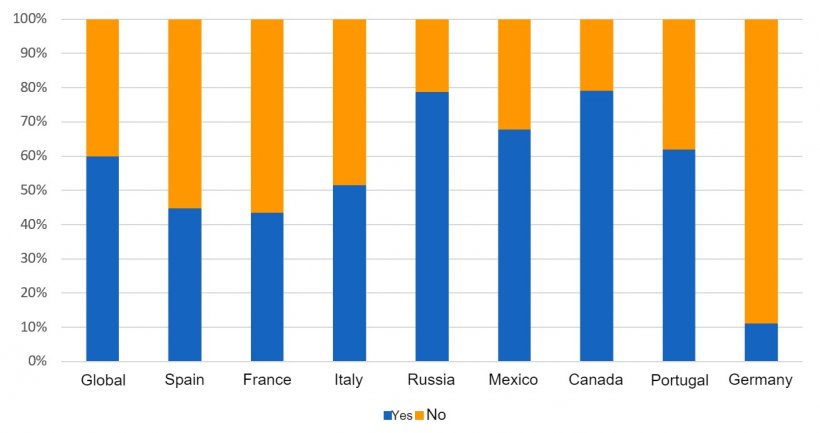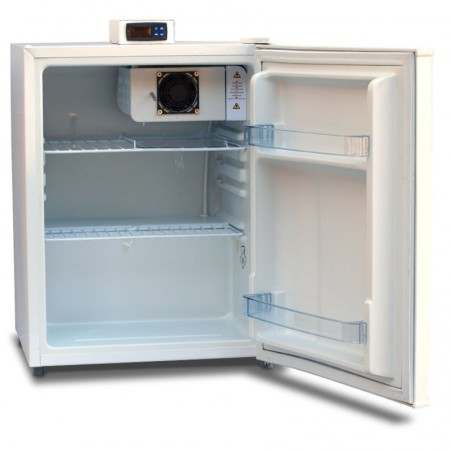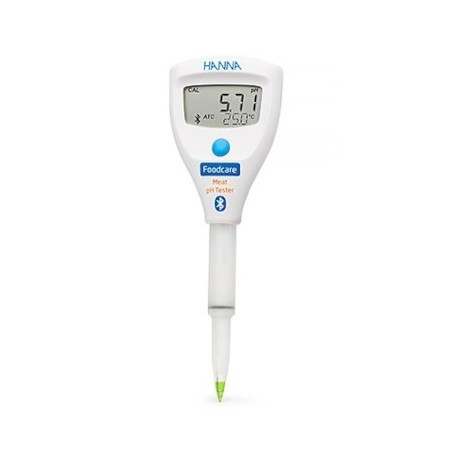There are many management practices that, being widespread, have never been scientifically verified. The practice of rotating semen doses, under the logic of preventing sperm sedimentation and offering better access to the extender nutrients, is a routine that is implemented in many farms.
When we have asked our users if they rotate semen doses, out of a total of 534 answers, the option YES wins at a global level by 60% versus 40% of the NO. In figure 1 we see the detail of the countries with the largest number of answers, to which we have added Germany, with short number of answers but with a pattern clearly different than the other countries.


Note: results by country are available here
When we look at the activity profile of the users who have answered, we see that the topic clearly arouses interest in producers and veterinarians. The answers follow the same pattern with a slight victory of the YES, but related to any particular activity (Figure 2).

And which is the right answer? The team of Dr. Martin Schulze of the Institute for Reproduction of Farm Animals Schonow in Germany conducted the trials summarised below which assessed the effects of rotating semen doses during on-farm storage. The results of 90% of the option NO that we have received from our german users, even with few answers, gives us an idea of the result of the trial and the efficient communication that was made of the results in the country.
Is rotation of boar semen doses during storage affecting its quality?
Rotation of boar semen doses during storage is widely used to prevent the sedimentation of the sperm. Sedimentation of spermatozoa during liquid storage is commonly regarded as harmful, presumably thinking about the local decrease of pH as a result of the accumulation of toxic metabolites.
To bring some objective data on this issue, the Institute for the Reproduction of Farm Animals Schönow did two trials. Semen doses with BTS extender were allocated to 3 different groups:
A) Non-rotated tubes
B) Manual rotation at 180° every 12 h
C) Five automatic rotations of 360° per hour
First trial compared A, B and C using a BTS extender and second trial compared A and C using a pH–stabilized variant of BTS. The doses were kept for 5 days at 17º C and different measurements were performed regarding:
- pH
- Motility and morphology of sperm
- Membrane integrity and mitochondrial status
- Sperm viability and mitochondrial activity
And, what was the result?
- Rotated semen exhibited significantly decreased progressive sperm motility compared to non-rotated samples.
- In trial 1, pH of rotated doses showed a significant shift from pH 7.3 to pH 7.5. In Experiment 2, pH remained unchanged at approximately 7.1
Conclusion
The present study shows that rotation of semen doses during in vitro storage affects sperm quality.
Rotation of semen tubes resulted in a loss of motility and differences of kinematic parameters which became especially obvious after prolonged incubation at 38°C.
The first trial, using a simple BTS extender, saw a change in pH in the different treatments. Rotation of extended semen promotes loss of CO2 from the liquid phase into the air compartment of the semen tubes leading to accelerated alkalinization of the semen suspension that could be related to decreased sperm motility and increased beat cross frequency. The researchers made the hypothesis that the negative effect of rotation will be abolished by using a pH-stabilized extender but despite observing a constant pH during storage at the second trial, automatic rotation resulted in a loss of total and progressive motility, beat cross frequency and velocity parameters after long-term incubation at 38°C.
The biological mechanisms for these results are as yet unknown but rotation of semen doses culminates in a loss of sperm motility. Maybe, the sedimentation of spermatozoa could create a beneficial microenvironment for maintenance of sperm longevity.
Regardless of the underlying mechanism, it is concluded that the actual recommendations should be that boar semen doses for AI should no longer be rotated during storage at 17°C.
333 would like to thank the collaboration of Dr Schulze for his collaboration in this writing.
More info at: M Schulze, K Rüdiger and D Waberski. Rotation of boar semen doses during storage effects sperm quality. Reproduction in Domestic Animals 50(4) · May 2015 DOI: 10.1111/rda.12532
333 editorial staff









